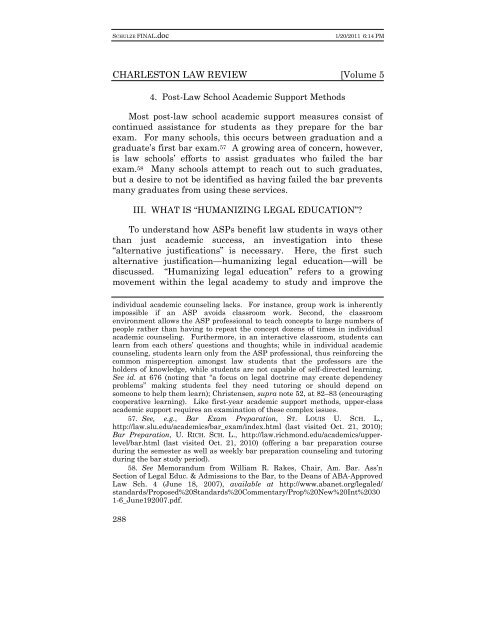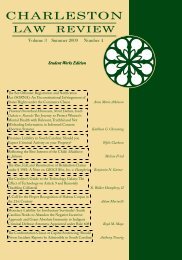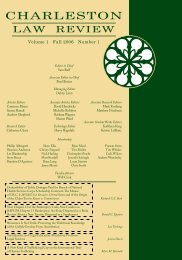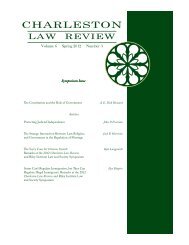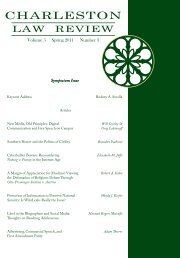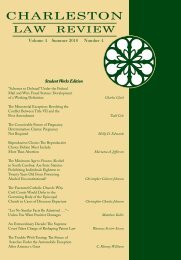Volume 5 Winter 2011 Number 2 - Charleston Law Review
Volume 5 Winter 2011 Number 2 - Charleston Law Review
Volume 5 Winter 2011 Number 2 - Charleston Law Review
You also want an ePaper? Increase the reach of your titles
YUMPU automatically turns print PDFs into web optimized ePapers that Google loves.
SCHULZE FINAL.doc1/20/<strong>2011</strong> 6:14PMCHARLESTON LAW REVIEW [<strong>Volume</strong> 54. Post-<strong>Law</strong> School Academic Support MethodsMost post-law school academic support measures consist ofcontinued assistance for students as they prepare for the barexam. For many schools, this occurs between graduation and agraduate’s first bar exam. 57 A growing area of concern, however,is law schools’ efforts to assist graduates who failed the barexam. 58 Many schools attempt to reach out to such graduates,but a desire to not be identified as having failed the bar preventsmany graduates from using these services.III. WHAT IS “HUMANIZING LEGAL EDUCATION”?To understand how ASPs benefit law students in ways otherthan just academic success, an investigation into these“alternative justifications” is necessary. Here, the first suchalternative justification—humanizing legal education—will bediscussed. “Humanizing legal education” refers to a growingmovement within the legal academy to study and improve theindividual academic counseling lacks. For instance, group work is inherentlyimpossible if an ASP avoids classroom work. Second, the classroomenvironment allows the ASP professional to teach concepts to large numbers ofpeople rather than having to repeat the concept dozens of times in individualacademic counseling. Furthermore, in an interactive classroom, students canlearn from each others’ questions and thoughts; while in individual academiccounseling, students learn only from the ASP professional, thus reinforcing thecommon misperception amongst law students that the professors are theholders of knowledge, while students are not capable of self-directed learning.See id. at 676 (noting that “a focus on legal doctrine may create dependencyproblems” making students feel they need tutoring or should depend onsomeone to help them learn); Christensen, supranote 52, at 82–83 (encouragingcooperative learning). Like first-year academic support methods, upper-classacademic support requires an examination of these complex issues.57. See, e.g., Bar Exam Preparation, ST. LOUIS U. SCH. L.,http://law.slu.edu/academics/bar_exam/index.html (last visited Oct. 21, 2010);Bar Preparation, U. RICH. SCH. L., http://law.richmond.edu/academics/upperlevel/bar.html(last visited Oct. 21, 2010) (offering a bar preparation courseduring the semester as well as weekly bar preparation counseling and tutoringduring the bar study period).58. See Memorandum from William R. Rakes, Chair, Am. Bar. Ass’nSection of Legal Educ. & Admissions to the Bar, to the Deans of ABA-Approved<strong>Law</strong> Sch. 4 (June 18, 2007), available at http://www.abanet.org/legaled/standards/Proposed%20Standards%20Commentary/Prop%20New%20Int%20301-6_June192007.pdf.288


